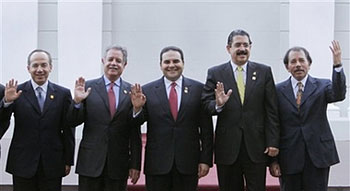 |
 |
 |
 News Around the Republic of Mexico | January 2007 News Around the Republic of Mexico | January 2007  
Calderon Sees Mexico as Americas Power Broker
 Carlos Luken - MexiData.info Carlos Luken - MexiData.info


| | From left, Mexico's President Felipe Calderon, Guatemala's President Oscar Berger, El Salvador 's President Tony Saca, Honduras's President Manuel Zelaya, and Nicaragua's President Daniel Ortega, pose for the official photo during the celebrations of the 15 the anniversary of the peace agreements that ended the 12 year long civil war in El Salvador, San Salvador, on Tuesday, Jan. 16, 2007. (AP/Alexandre Meneghini) |
For the past century, US-Mexico affairs have largely been halfhearted and ineffective efforts to bridge both nations’ interests. Although mostly cordial, the relationship has seldom been among equals, and US diplomacy has swung between blatant interventions to tacit harassment.

It’s no wonder that every prominent Mexican politician has quoted two phrases at least once in their careers, one by dictator Porfirio Diaz: “Poor Mexico, so far from God and so close to the United States.” The other a popular adage, “The U.S. has no friends, only interests.”

Oddly these two aphorisms express the friendliest sentiment held for the US in Latin America by most countries and their peoples.

The feeling has been well earned. While the United States is generally acknowledged as the world’s mightiest power, it is also identified as the neighborhood bully. Latin America has tolerated ill-advised policies ranging from the Monroe Doctrine to Roosevelt’s gunboat diplomacy to US-backed autocrats, military interventions, and monetary and fiscal pressures.

Latin Americans still deeply resent that all measures were forcefully undertaken without the courtesy of any national choice. Some actions resulted in the country’s economic development, but also in the imposition and support of ruthless and corrupt dictatorships that ended up doing more harm than good to local citizens and US prestige.

Governments’ embracement of free market policies and fiscal discipline, under the patronizing endorsement of the US, has been widely perceived as a velvet form of American intervention resulting in rising inflation, unemployment and corruption — all leading to increased poverty. As well, anti-American sentiments are bizarrely tangled with rising criticism for America’s war in Iraq.

Many political observers believe that these are the main causes for regional electoral backlashes in favor of leftist and populist policies in countries like Argentina, Brazil, Uruguay, Ecuador, Bolivia, Chile and Nicaragua, falling just short of taking over Mexico and Peru. The self-styled “new left” has interrelated with the compulsive socialist regimes of Venezuela and Cuba, embracing Venezuelan President Hugo Chavez’s raging condemnations of the US, and his delusion of a Latin American surge as a new Bolivarian Socialist Block.

Chavez has energized himself as Castro’s illness takes its toll. Like typical caudillos, Chavez is blatantly buying influence among his Latin American neighbors by funneling his oil billions through populist offerings, state-controlled economies, and mutual defense programs that have in the past ravaged the region’s economies.

Chavez’s recent nationalization decrees, and his termination of opposition media concessions, have also raised eyebrows among foreign investors who have already begun to leave the region.

After September 11, 2001, Latin America’s importance as part of the US foreign policy scheme was understandably relegated, or as some leaders believe confirmed, to secondary status. The vital immigration reform sought by most nations was unceremoniously dumped.

Today, Mexican President Felipe Calderon (a moderate conservative) along with other regional centrist leaders, recognize that the hazardous road of Latin America’s new left will lead, as in the past, to economic, social and political downfall. As such, Calderon is positioning Mexico and his programs as viable alternatives for the region’s development.

Not willing to repeat his predecessor’s mistakes, by being overly supportive and thus losing credibility when branded a US lapdog, Calderon has just taken his first international trip to Central America as president. There he was clear that although being part of North America, Mexico is a Latin American nation whose essence and traditions were deeply rooted to its southern neighbors. And in an effort to leave an open door for future accommodations, he stated that he will seek rapprochement with Cuba, plus he took the occasion to exchange pleasantries with Chavez after the latter had insulted him during Mexico’s presidential campaign.

Calderon hopes to strengthen Mexico’s position as Latin America’s leading moderate nation. He was the only foreign spokesperson during the anniversary ceremony commemorating the XV anniversary of the signing of the El Salvador Peace Accords. He was given a standing ovation after stating that dictators rise both from the left and the right, underlining his hope that the region will elect capable and popular leaders who look toward the future and avoid past mistakes.

It’s felt that the electoral condemnation suffered by Bush and his administration during the past elections, and with pressure being brought by the US Congress to recoil from the Middle East, that Latin America’s trade, security and oil importance to the United States could again surge. However the current political forces America faces may no longer be time-honored, and Mexico’s leverage will be fundamental.
Carlos Luken, a MexiData.info columnist, is a Mexico-based businessman and consultant. He can be reached via email at ilcmex@yahoo.com. | 
 | |
 |



